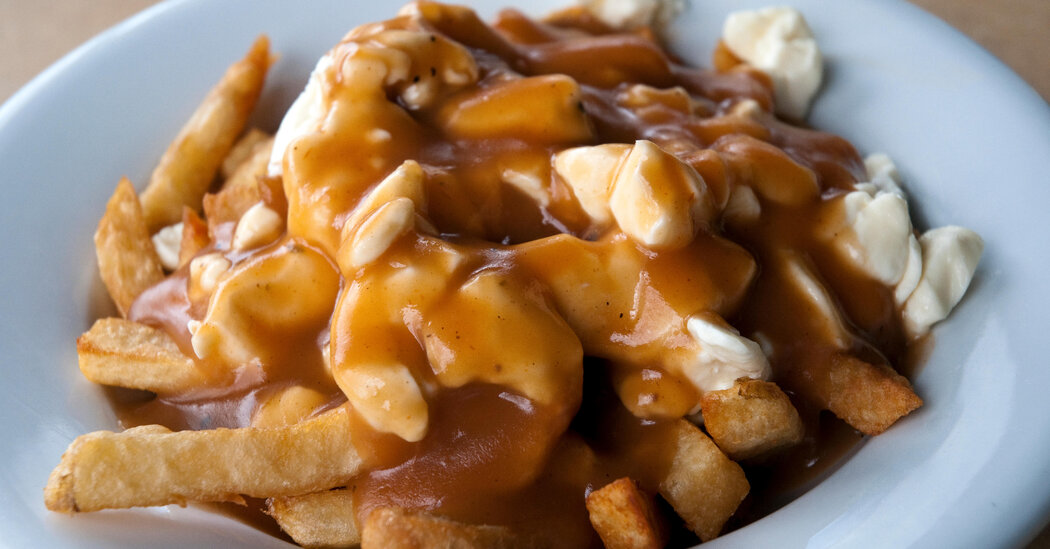MONTREAL — A Quebec restaurant credited with inventing poutine, the beloved trouser-busting dish of French fries, cheese curds and gravy, has decided to rebrand because of what it calls an unfortunate coincidence: President Vladimir V. Putin’s name in French is spelled and pronounced “Poutine.”
Laurent Proulx, co-owner of Le Roy Jucep, the diner in central Quebec that claims to have served the world’s first poutine after it opened in 1964, said he had decided to temporarily remove the word “poutine” from its trademark and Facebook page. As a symbolic stand against “Monsieur Poutine’s” aggression, the restaurant announced this month that it was rebranding itself as “the inventor of the fries-cheese-gravy.”
Mr. Proulx, a veteran of the war in Afghanistan, said he wanted to show his solidarity with Ukraine.
“I know what war is and what it means for innocent civilians,” he said. “I wanted to make this little gesture to show Ukrainians we are thinking of them.”
Mr. Proulx said he had been trolled by pro-Russian activists, who had called the restaurant to berate him.
The renaming of “poutine” recalled another conflict in 2003, when proponents of the United States-led war in Iraq renamed French fries “freedom fries” to show their displeasure with France’s refusal to support the invasion.
The Poutine revolt by poutine’s inventor underscores how the Russian invasion is spilling over into global culture. Food and drink names across the world have taken on new political baggage, as boycotts of Russian products also take hold.
In the United States, some bars are removing Russian Mule or Moscow Mule cocktails from their menus and renaming them “Kyiv Mules” or “U.N. Mules.” Putin Pub, a popular hangout among Jerusalem’s Russian-speaking community, has removed the word “Putin” from its outdoor signage.
Russian-made vodka, a drink that was popularized in the West by James Bond and is among Russia’s most identifiable exports, is now the target of an international backlash. New Hampshire announced it was removing “Russian-made and Russian-branded spirits” from state-run stores. Quebec’s state-run liquor stores are slashing 10 Russian-made spirits from their offerings.
Russia-Ukraine War: Key Things to Know
Civilians caught in attacks. As Russia steps up increasingly indiscriminate assaults on civilian targets and infrastructure in Ukraine, fears are growing that thousands of Ukrainians could die in the coming days if relief does not arrive and humanitarian cease-fires fail to take hold.
Russia has also found itself increasingly ostracized from global sporting and cultural events. The International Olympic Committee recommended that athletes from Russia be barred from sporting events, and the Eurovision Song Contest, the wildly popular singing competition, has also barred Russia from participating.
In the Francophone world, calling Mr. Putin “Poutine” in French may be a matter of diplomacy, though there are disagreements in some linguistic quarters over the origin of the pronunciation.
In French, the English word “Putin” is pronounced the same way as “putain,” a very popular swear word. One theory behind why Mr. Putin is called Poutine in French is that spelling his name as “Putin” would mislead French speakers to pronounce it like their famous insult, while presenting a diplomatic challenge at summit meetings, among other places.
But several linguistic scholars discounted the insult theory. Tatiana Bottineau, a professor of Russian linguistics at the Institut National des Langues et Civilisations Orientales in Paris, said that Poutine was written and pronounced like the fatty Quebecois dish, “poutine,” because the transliteration of the Russian president’s name from Cyrillic into French was different from its transliteration into English.
Sergueï Sakhno, a professor of Russian linguistics at Sorbonne University in Paris, observed that such differences in transliteration also explained why, for example, the Russian author Alexander Pushkin was written in French as “Alexandre Pouchkine.”
Mr. Proulx said he had been deeply moved after his gesture was acknowledged across the Atlantic in Ukraine. Natalia Moussienko, a research fellow at the Modern Art Research Institute in Kyiv, told Radio Canada, the French-language Canadian broadcaster, that she applauded the restaurant. She commended it for its decision to “DePoutineize poutine.”
Adele Cordonnier contributed reporting from Paris.


























